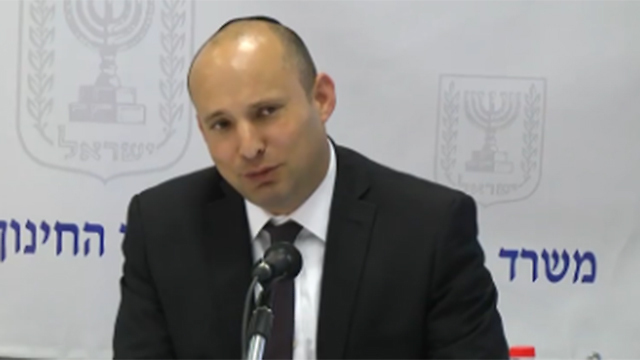
Education Minister Bennett
צילום: אבי מועלם
Six Council for Higher Education members resign
Resignation comes on the heels of decision by Education Minister Bennett, who also chairs the council, to replace deputy chair, who the resigning members say is less qualified.
Six members of Israel's Council for Higher Education resigned on Sunday morning in protest of the policies of Education Minister Naftali Bennett, who is also the council's chairman.
The six are: Prof. Moshe Maor of the Hebrew University in Jerusalem, who is the chairman of the council's subcommittee on Social Studies, Law, Business Management, and multidisciplinary programs in the Humanities and Social Studies; Prof. Judith Gal-Ezer from the Open University, who is the chairman of the higher committee for Recognition, Authorization and Licensing; Prof. Eli Zeldov of the Weizmann Institute of Science; Prof. Fadia Nasser-Abu Alhija of Tel Aviv University, who is the chairman of the subcommittee on Education, Pedagogy, Humanities and Art; Prof. Chaya Kalcheim of the Hebrew University; Prof. Hagit Messer-Yaron of Tel Aviv University, who was removed from her position as the deputy council chairman.
The six demanded in their letter of resignation to immediately disperse the current council and appoint a new one, whose members will be selected in a transparent process.
"The moves and steps taken have hurt the essence of the work of the Council for Higher Education, its independence and the nature of its activities," the six wrote. "These steps undermine the academic community's trust in the 12th Council for Higher Education."
Prof. Judith Gal-Ezer told Ynet that "The best interests of higher education were in our minds (when deciding to resign), and this is a move we've been deliberating on for quite a long time."
She said the main reason behind their decision to resign was the removal of Prof. Messer-Yaron from her position as the deputy chair. "It wasn't clear why she was removed from her position; we did not receive any clear or convincing messages from the minister (Bennett). She's a professor, a professional with vast knowledge of higher education, and did an excellent job. A doctor (Dr. Rivka Wadmany Shauman), rather than a professor, was appointed to replace her (Messer-Yaron). She (Dr. Wadmany Shauman) is a senior lecturer who is dependent on the Council for Higher Education's appointment committee for her own advancement, and so because of a conflict of interests, she cannot deal with the appointment of professors."
Gilad Arditi, the chairman of the National Students Union and a member of the Council, came out against the resignation. "In my opinion, the criticism misses the point, big time. The main problem in the Council for Higher Education, both now and in the past, is that it is trying to micro-manage the (academic) institutions and fails to realize its job is to run the system on the macro level. Many candidates are suitable for a macro-level type of role, even if they are not professors. We as students hope that the current shake up leads to a significant clarification of the council's place and role, so academic institutions can have independencein management, while the council challenges them on the general policy level."
After Bennett's decision to replace the deputy chair, rectors from all of the universities in Israel, as well as over 1,500 academics, signed a petition in protest of the move. According to the petitioners, Messer-Yaron's removal from the position and the appointment of Wadmany Shauman to replace her were done in a controversial manner.
Messer-Yaron, they said, "fulfilled her role with professionalism, and her replacement - which was recommended on by the minister and voted for by almost two-thirds of council members - is a senior lecturer but does not have a leading professional standing in her field, as is required of an academic leader."
The resignation will paralyze the council, as according to the law, the number of members at the Council for Higher Education can be no less than 19 members, and there are only 16 left.
The council said in response: "We extend our gratitude to the retiring members of the council for their contribution to higher education. The council continues its activity and other senior academics with a high standing in higher education will be appointed in their place in the coming days."











